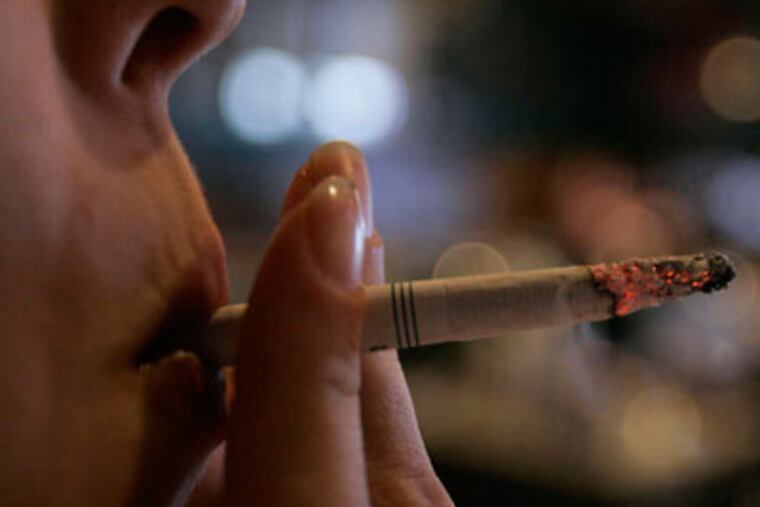A central Pennsylvania health system says it won't hire smokers
The vaunted Geisinger Health System in central Pennsylvania ushered in the new year by becoming the latest employer to resolve not to hire smokers.

The vaunted Geisinger Health System in central Pennsylvania ushered in the new year by becoming the latest employer to resolve not to hire smokers.
The shift toward policies that ban smokers, not just smoking, has been growing in Pennsylvania and the 20 other states that allow it. Beginning in the 1980s with big companies such as Turner Broadcasting and Alaska Airlines, no-nicotine hiring practices have been embraced by police and fire departments, medical centers, even an Ohio casino.
Like these other organizations, Geisinger says its policy, effective next month, will reduce health-care costs and decrease absenteeism among its 15,000 employees, while encouraging healthier living.
But throwing the smoker out with the smoke is a controversial trend, one that makes even some longtime tobacco-control advocates uncomfortable.
Critics say that even if individual employers save money - data are scarce - there is no evidence that the hiring policies have reduced smoking rates or benefited the overall public health.
And if discriminating against smokers is OK, what about people with other legal but dangerous habits such as heavy drinking, overeating, promiscuity, or motorcycle riding?
"Employment decisions should be made based on qualifications for the job," said Michael Siegel, a physician and tobacco-control researcher at the Boston University School of Public Health. "Once we open the door to looking at a person's personal life, we open up the floodgates."
Federal and most state laws prohibit discrimination on five grounds - race, sex, age, handicap, and religion. Religious freedom is constitutionally protected, while race, sex, age, and disability are innate conditions, outside an employee's control.
A smoker, in contrast, "has only to give up smoking off the job in order to be eligible for employment," the antismoking group Action on Smoking and Health says.
That view "ignores the deeply addictive nature of smoking," said Jennifer Ibrahim, a Temple University tobacco-control policy expert. "We know that quitting doesn't happen overnight."
Marcy Marshall, a spokeswoman for Geisinger, which has banned smoking on its far-flung properties since 2007, said the new hiring policy "is a legal practice, so we don't consider it discrimination. Smokers are not a legally protected class in Pennsylvania."
But smokers are protected by employment laws in Washington, D.C., and 29 states, including New Jersey and New York. These laws - for which the tobacco industry lobbied - are varied. Some prohibit discrimination against smokers, while others protect any lawful behavior off the job.
On top of inconsistent laws, the hiring policies usually involve a double standard: one for applicants, another for current workers. Geisinger, for example, will reject job-seekers - including medical students and volunteers - based on nicotine tests, but current workers who smoke will be "encouraged to take advantage of" the health system's quit-smoking programs.
No-smoker rules also pose enforcement dilemmas.
After hiring someone, Geisinger will rely on the honor system, not periodic nicotine testing, Marshall said. Meanwhile, Roxborough Memorial Hospital in Philadelphia is "very seriously considering" a no-smokers-wanted policy that would include periodic, random testing after hiring, said chief personnel officer Michael Henrici.
Roxborough, which plans to become a smoke-free campus by September, already randomly tests 10 percent of its 720 employees for drugs each year, Henrici said. Employees also sign an annual smoking affidavit; a health-insurance surcharge is imposed on those who have not kicked the habit.
Some organizations have gone further, imposing a health-insurance surcharge on nonsmoking workers whose covered spouses smoke.
It is difficult to say how many smokers are getting turned away, but the percentage is small if Abington Memorial Hospital's experience is any guide. Since its policy was implemented July 1, six of 342 prospective hires have been rejected because they tested positive for nicotine, the hospital said.
R. Joseph Barton, a Washington lawyer specializing in employee benefits, said: "I don't think employers should have a right to ask what you're doing in private. You're an employee, not a serf. And from a cost-containment perspective, there are far riskier behaviors to engage in than smoking."
Nonetheless, he said, courts have sided with employers in the few cases that have challenged discrimination against smokers.